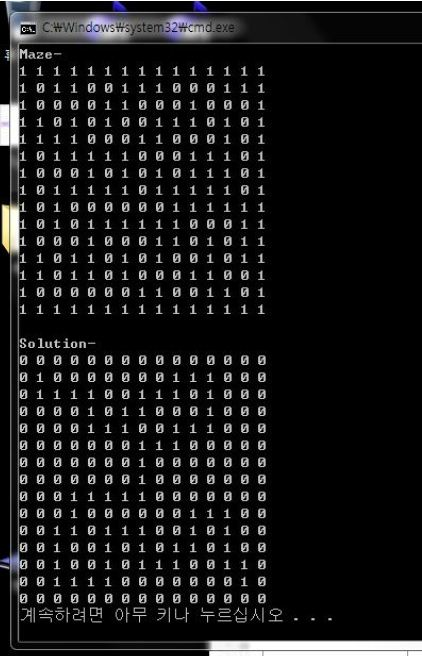스택을 이용한 미로찾기 (Maze Problem ver. Stack)
Sample

maze.txt (maze map)
txt
1 1 1 1 1 1 1 1 1 1 1 1 1 1 1
1 0 1 1 0 0 1 1 1 0 0 0 1 1 1
1 0 0 0 0 1 1 0 0 0 1 0 0 0 1
1 1 0 1 0 1 0 0 1 1 1 0 1 0 1
1 1 1 1 0 0 0 1 1 0 0 0 1 0 1
1 0 1 1 1 1 1 0 0 0 1 1 1 0 1
1 0 0 0 1 0 1 0 1 0 1 1 1 0 1
1 0 1 1 1 1 1 0 1 1 1 1 1 0 1
1 0 1 0 0 0 0 0 0 1 1 1 1 1 1
1 0 1 0 1 1 1 1 1 1 0 0 0 1 1
1 0 0 0 1 0 0 0 1 1 0 1 0 1 1
1 1 0 1 1 0 1 0 1 0 0 1 0 1 1
1 1 0 1 1 0 1 0 0 0 1 1 0 0 1
1 0 0 0 0 0 0 1 1 0 0 1 1 0 1
1 1 1 1 1 1 1 1 1 1 1 1 1 1 1Source Code
Main.cpp
cpp
#include "Maze.h"
#include <iostream>
int main(void)
{
try
{
Maze* test;
test = new Maze("maze.txt"); // txt file open
int t = test->Find(1,1,13,13); // 길찾기.
// Find함수는 올바른 경로를 스택에 저장한다.
// 올바른 경로가 존재하면 1을 반환하고 나머지 경우는 0을 반환한다.
if (t==0)
throw "No escape route.";
test->Sol();// 스택에 저장된 경로를 보여준다(출력부분)
}
catch(char* e)
{
std::cout << e << "\n";
}
}Stack.h
cpp
#ifndef STACK_H
#define STACK_H
#include "Location.h"
class Stack
{
private:
Location* stack;
int top;
int capacity;
public:
Stack(int stackCapacity = 10);
bool IsEmpty();
Location Top();
void Push(Location item);
Location Pop();
};
#endifStack.cpp
cpp
#include "Stack.h"
#include "Location.h"
Stack::Stack(int stackCapacity)
{
capacity = stackCapacity;
if(capacity < 1)
throw "Stack capacity must be > 0";
stack = new Location[capacity];
top = -1;
}
bool Stack::IsEmpty()
{
return top == -1;
}
Location Stack::Top()
{
if(IsEmpty())
throw "Stack is empty";
return stack[top];
}
void Stack::Push(Location x)
{
if(top < capacity-1)
{
stack[++top] = x;
} else {
throw "Stack is full";
}
}
Location Stack::Pop()
{
if(IsEmpty())
throw "Stack is empty";
return stack[top--];
}Location.h
cpp
#ifndef LOCATION_H
#define LOCATION_H
class Location
{
private:
int x;
int y;
public:
//클래스 동적배열을 사용하기 위해 기본 생성자를 사용한다.
//Location();
//Location(int xx, int yy);
void Replace(int xx, int yy); // 객체에 x,y좌표를 재대입한다
void Up(); // y->y-1
void Down();// y->y+1
void Left();// x->x-1
void Right();// x->x+1
int X();// 객체의 x를 출력
int Y();// 객체의 y를 출력
void Print(); // (x,y) 형식으로 출력
};
#endifLocation.cpp
cpp
#include <iostream>
#include "Location.h"
void Location::Replace(int xx, int yy) { x=xx; y=yy; }
void Location::Up() { y--; }
void Location::Down() { y++; }
void Location::Left() { x--; }
void Location::Right() { x++; }
int Location::X() { return x; }
int Location::Y() { return y; }
void Location::Print() { std::cout << "(" << x << ", " << y << ")\n"; }Maze.h
cpp
#ifndef MAZE_H
#define MAZE_H
#include "Stack.h"
#include "Location.h"
class Maze
{
private:
int Map[15][15]; // 미로 정보를 저장할 이차원 배열
Stack* Path; // 스택
Location* P; // 임의의 좌표
public:
Maze(char* str); // 생성자
int IsBlock(Location* p); // p가 벽인지 길인지 확인하는 함수
int Find(int x1,int y1,int x2,int y2); // 통합 길찾기 함수
void Sol(); // 정답 출력
};
#endifMaze.cpp
cpp
#include <iostream>
#include <fstream>
#include "Maze.h"
using std::ifstream;
Maze::Maze(char* str)
{
// 파일을 읽어서 배열에 저장한다
ifstream in_file;
in_file.open(str);
int i,j;
for(i=0;i<15;i++)
{
// in_file.getline(temp,30);
for(j=0;j<15;j++)
{
// t=temp[j];
// Map[i][j]=atoi(&t);
in_file>>Map[i][j]; // 자동 형변환.. "1 "또는 "0 " 을 1,0 으로 변환
}
}
in_file.close();
// 끝
Path = new Stack(1000);
}
int Maze::IsBlock(Location* p)
{
return Map[p->Y()][p->X()]; // 벽이면 1, 길이면 0을 반환
}
int Maze::Find(int x1,int y1,int x2,int y2)
{
int result;
Location T;
P = new Location();
P->Replace(x1,y1);
if(Path->IsEmpty()) T.Replace(-2,-2); // 처음 실행했을때(스택이 비어있을때) 허위값을 넣는다
else T = Path->Top(); // T에 가장 최근 지나온 길의 좌표를 넣는다
Path->Push(*P); // 스택에 현재 좌표를 대입한다
if((x1==x2)&&(y1==y2)) return 1; // 시작점과 도착점이 같으면 1을 반환 (경로찾기 성공)
// 현재 좌표에서 4방향을 모두 검사한다
// 북쪽
P->Up(); // 임시로 점을 북쪽으로 한칸 옮긴다
if((P->X()!=T.X())||(P->Y()!=T.Y())) // 스택에 저장된 최근 경로값과 현재 좌표가 같지 않다면
{ // 같게 된다면 이 방향으로는 경로가 존재하지 않으므로 skip한다
if(!IsBlock(P)) // 벽이 아니면
{
result = Find(P->X(),P->Y(),x2,y2); // 이 지점부터 다시 경로를 찾는다 ex) (3,2)->(13,13) => (3,2)->(3,1)->(13,13)
if(result == 0) // 경로가 없으면
Path->Pop(); // 지나간 경로를 지운다
else
return result; // 경로가 존재한다면 1을 반환하고 종료
}
}
P->Down(); // 점을 다시 제자리로
// 남쪽 (알고리즘은 위와 동일)
P->Down();
if((P->X()!=T.X())||(P->Y()!=T.Y()))
{
if(!IsBlock(P))
{
result = Find(P->X(),P->Y(),x2,y2);
if(result == 0)
Path->Pop();
else
return result;
}
}
P->Up();
// 서쪽
P->Left();
if((P->X()!=T.X())||(P->Y()!=T.Y()))
{
if(!IsBlock(P))
{
result = Find(P->X(),P->Y(),x2,y2);
if(result == 0)
Path->Pop();
else
return result;
}
}
P->Right();
// 동쪽
P->Right();
if((P->X()!=T.X())||(P->Y()!=T.Y()))
{
if(!IsBlock(P))
{
result = Find(P->X(),P->Y(),x2,y2);
if(result == 0)
Path->Pop();
else
return result;
}
}
P->Left();
return 0; // 4방향 모두 경로가 없으므로 0을 반환
}
void Maze::Sol()
{
if(Path->IsEmpty()) throw "Error"; // 스택이 비어있거나 Find함수가 먼저 실행되지 않았을때
int i,j;
std::cout << "Maze-\n";
for(i=0;i<15;i++)
{
for(j=0;j<15;j++)
{
std::cout << Map[i][j] << " ";
}
std::cout << "\n";
}
std::cout << "\n" << "Solution-\n";
int sol[15][15];
Location temp;
for(i=14;i>=0;i--)
for(j=14;j>=0;j--)
sol[i][j]=0;
while(!Path->IsEmpty())
{
temp = Path->Pop();
sol[temp.Y()][temp.X()] = 1;
}
for(i=0;i<15;i++)
{
for(j=0;j<15;j++)
{
std::cout << sol[i][j] << " ";
}
std::cout << "\n";
}
}